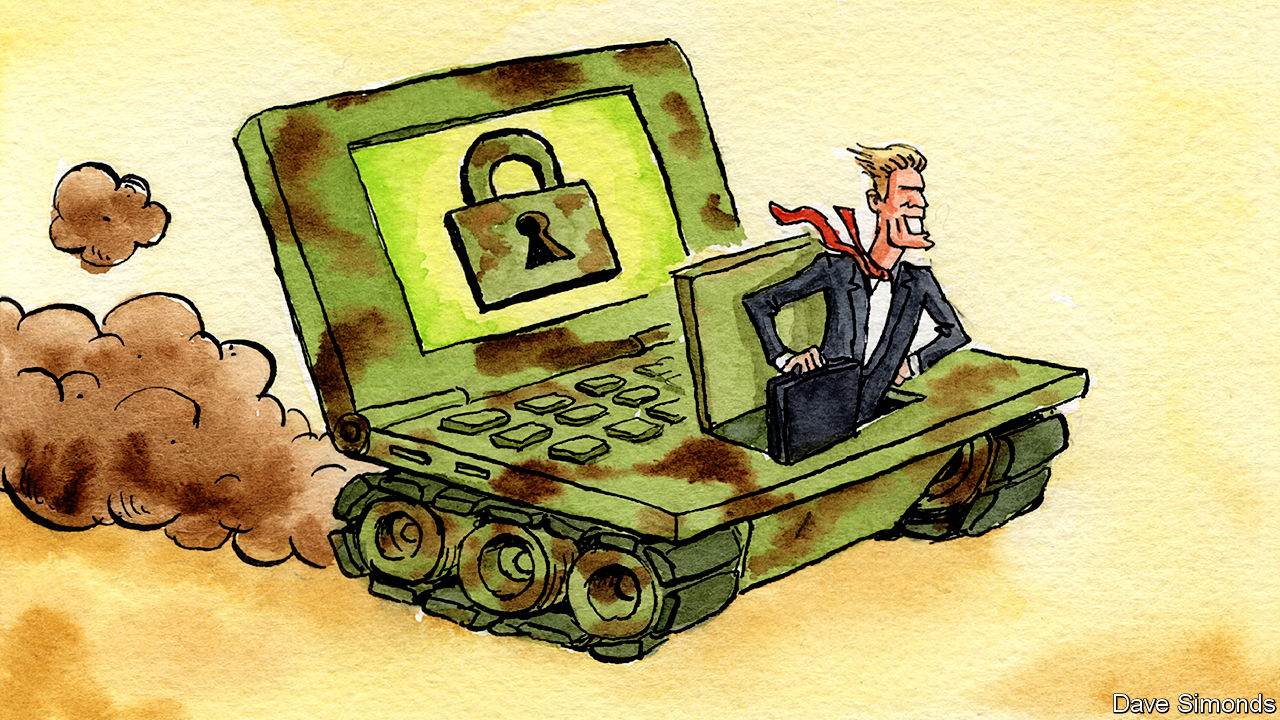 AIR shows are where the world’s defence giants show off. This year’s Farnborough Air Show, which ended on July 22nd, was no exception. The roar of the engines on Lockheed Martin’s F-35 stealth fighters overhead drowned out many a sales pitch on the ground. But pride of place at Raytheon’s display area went not to a weapon but to a “cyber dome”—a slick 3D cinema showing how hacking works. Its message was clear: governments and firms cannot afford to ignore cyber-attacks. Nor, indeed, can defence firms themselves.
AIR shows are where the world’s defence giants show off. This year’s Farnborough Air Show, which ended on July 22nd, was no exception. The roar of the engines on Lockheed Martin’s F-35 stealth fighters overhead drowned out many a sales pitch on the ground. But pride of place at Raytheon’s display area went not to a weapon but to a “cyber dome”—a slick 3D cinema showing how hacking works. Its message was clear: governments and firms cannot afford to ignore cyber-attacks. Nor, indeed, can defence firms themselves.
The size of the military and civil cyber-security market is an obvious reason why—it grew from $3.5bn in 2004 to $120bn in 2017. The market will expand by an annual 12-15% in the next three years, or twice as fast as global defence-equipment budgets, reckons Cybersecurity Ventures, a research firm. Spurred on by Russian internet attacks against the West, defence departments are considering spending far more on cyber-defences. In America, Congress is emphasising the importance of cyber-security; Britain’s government reportedly plans to shift some of the Ministry of Defence’s budget towards repelling cyber-threats. Private-sector companies routinely put cyber-security among their top worries.
Defence firms are no strangers to the market. They have had to fight off cyber-assaults on their own weapons and IT systems since the internet took off in the 1990s. About a decade ago they started to use this expertise to sell services to governments and private companies.
Yet the industry has struggled. Accustomed to dealing with huge defence departments with long procurement cycles, firms lacked experience in appealing to picky private firms with shorter time horizons. Many underestimated the level of competition in the industry. Only half a dozen firms assemble military jets whereas over 3,000 firms offer commercial cyber-security services. Defence companies then compounded this error by concentrating on making software that puts walls around systems to protect against attacks, which tech firms are better at.
Some firms chose to exit the market, bolstered by a booming business for conventional weapons; global military budgets this year will reach a new post-cold war high, reckons IHS Markit, a research firm. In 2015 Boeing sold off Narus, a software company, to Symantec, a rival tech firm. The same year General Dynamics sold its Fidelis commercial-cyber arm to a private-equity company.
Now, however, the market is shifting in their favour. Demand is rising for cyber-security services in which defence firms have more of an edge, from the active identification of threats to providing executives with strategies about how to manage the fallout from attacks. It is also becoming easier for them to leverage their historical expertise in military intelligence, now that both governments and companies are suffering similar sorts of cyber-attacks.
Firms are going back in. In April General Dynamics bought CSRA, a cyber-security specialist, for $9.7bn, in an effort to become the American government’s largest IT-services provider. Lockheed has thrown money at startups including Cybereason, a specialist in AI, as has L3 Technologies, a rapidly-growing American defence group.
Weapons companies reckon that their main customers, defence departments, see commercial cyber-security businesses as a type of credential. American officials have threatened to stop awarding contracts to firms whose weapons are deemed vulnerable to cyber-attacks. That came after a series of embarrassing hacks, including the theft early this year by China of American plans for a supersonic anti-ship missile from a naval contractor. Without its Applied Intelligence division, advisers to BAE Systems, Europe’s largest defence group, say it would have “serious trouble” selling further planes and missiles to Saudi Arabia, its main export customer.
And although they are currently making hay from hardware, defence giants worry that demand will fall after a two-year budget boost in America expires in 2020. They want to build cyber-security businesses to diversify while the “sun is shining”, says Frank Ford of Bain & Company, a consultancy. Executives still remember the 1990s, when military budgets plunged after the end of the cold war and many defence firms were forced to shut as they had little else to do. Cyber-security looks like being a lot less volatile.
No comments:
Post a Comment